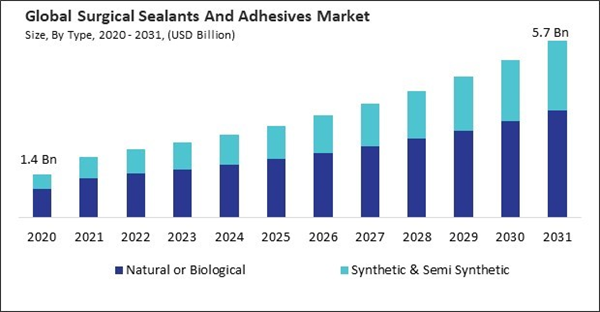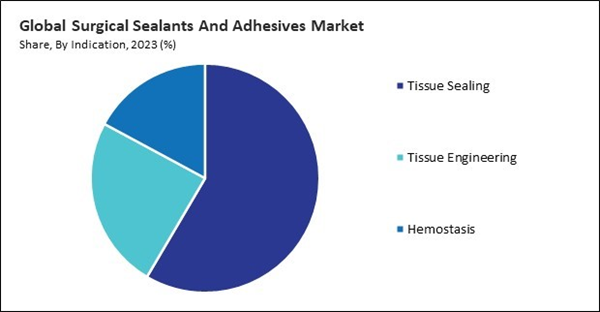The exceptional biocompatibility of polymeric hydrogels reduces the likelihood of detrimental or inflammatory reactions upon contact with biological tissues. This biocompatibility ensures patient safety and promotes optimal wound healing outcomes. Consequently, the polymeric hydrogels segment would acquire approximately 30.17 % share of the market by 2031. Hydrogels interact with tissues gently and non-disruptively, forming conformal seals or adhesions without causing tissue trauma or irritation. Therefore, these factors can assist in the growth of the segment.
Continuous advancements in medical technology have broadened the scope of surgical interventions, making procedures more accessible, efficient, and effective. Innovations such as robotic-assisted surgery, minimally invasive techniques, and enhanced imaging technologies have expanded the range of conditions treatable through surgery. Hence, these aspects will drive the growth of the market.
Additionally, MIS techniques offer numerous advantages over traditional open surgeries, making them increasingly popular among patients and healthcare providers. These advantages include reduced blood loss, smaller incisions, a shortened risk of infection, expedited recovery, shorter hospital stays, and diminished postoperative pain. Thus, these aspects can pose lucrative growth prospects for the market.
However, Bringing a new surgical sealant or adhesive to market involves rigorous testing to demonstrate its safety and effectiveness in various clinical settings. This testing typically includes preclinical studies to assess biocompatibility, toxicity, and mechanical properties, followed by clinical trials involving human subjects. Thus, owing to these factors, there can be a decreased demand for surgical sealants and adhesives.
Furthermore, in response to the heightened emphasis on infection prevention and control during the pandemic, there was a growing demand for sealant and adhesive products with antimicrobial properties. Surgeons and healthcare facilities prioritized products that provided effective wound closure and hemostasis and offered additional protection against healthcare-associated infections. Hence, the COVID-19 pandemic had a moderate impact on the market.
By Type Analysis
Based on type, the market is segmented into natural or biological and synthetic & semi synthetic. The natural or biological segment held the 64.29 % revenue share in the market in 2023. As sustainability becomes a priority across industries, including healthcare, there is a growing demand for greener, more sustainable alternatives that minimize environmental footprint throughout their lifecycle. Thus, these factors will assist in the growth of the segment.By Natural or Biological Analysis
The natural or biological segment is segmented into fibrin sealants, collagen-based adhesives, and gelatin-based adhesives. The fibrin sealants segment recorded a 49.07 % revenue share in the market in 2023. The growing utilization of robotic-assisted, laparoscopic, endoscopic, and other minimally invasive surgical techniques has stimulated the need for sophisticated hemostatic and sealing agents, including fibrin sealants. These sealants offer precise application, effective tissue adherence, and rapid hemostasis, making them well-suited for minimally invasive approaches where access to bleeding sites may be limited. Hence, the segment will grow rapidly in the coming years.By Synthetic & Semi synthetic Analysis
The synthetic and semi synthetic segment is further divided into cyanoacrylates, polymeric hydrogels, and urethane-based adhesives. In 2023, the cyanoacrylates segment witnessed a 54.36 % revenue share in the market. Cyanoacrylate adhesives are renowned for achieving rapid hemostasis and tissue sealing, making them invaluable tools in surgical procedures where efficient bleeding control and wound closure are paramount. Therefore, owing to these aspects, the segment will expand rapidly.By Indication Analysis
On the basis of indication, the market is divided into tissue sealing, tissue engineering, and hemostasis. In 2023, the tissue engineering segment witnessed a 24.36 % revenue share in the market. Tissue engineering represents a cutting-edge approach to addressing tissue defects, injuries, and organ dysfunction by harnessing biology, engineering, and materials science principles to regenerate or replace damaged tissues and organs. Therefore, owing to these factors, the segment will witness increased demand in the upcoming years.By Application Analysis
Based on application, the market is divided into central nervous system, cardiovascular, general surgery, orthopedic, cosmetic, pulmonary, urology, ophthalmology, and others. The general surgery segment recorded a 23.86% revenue share in the market in 2023. The increasing prevalence of chronic diseases, the aging population, and the expanding healthcare infrastructure have led to a rise in the volume of general surgical procedures globally. Thus, these factors can lead to increased demand in the segment.By Regional Analysis
By region, the market is segmented into North America, Europe, Asia Pacific, and LAMEA. In 2023, the Europe segment acquired a 29.53% revenue share in the market. European healthcare systems prioritize patient safety, quality of care, and evidence-based practices. Surgical sealants and adhesives offer advantages in reducing the risk of postoperative complications, such as bleeding, infections, and wound dehiscence, aligning with the region's focus on improving surgical outcomes. Therefore, these aspects can help in the growth of the segment.Recent Strategies Deployed in the Market
- 2024-Jan: Medline Industries, LP has unveiled its newest addition to the advanced wound care lineup: the OptiView® Transparent Dressing with HydroCore™ Technology. This cutting-edge wound dressing boasts a clear design, allowing caregivers to conveniently inspect, monitor, and evaluate skin condition without removing the dressing. With OptiView, caregivers can easily identify changes in skin texture, color, and early signs of breakdown, streamlining wound care procedures. Medline continues its legacy of innovation in wound care, striving to improve efficiency and provide essential tools and expertise for optimal patient care.
- 2023-Jul: Baxter International, Inc. has introduced PERCLOT, a new absorbable hemostatic powder. It's designed for patients with intact coagulation to manage mild bleeding. PERCLOT consists of absorbable polysaccharide granules derived from purified plant starch. These granules quickly absorb water, forming a gel-like matrix that acts as a barrier against further bleeding. It's used during various surgical procedures to control bleeding effectively.
- 2022-Dec: Integra LifeSciences Holdings Corporation has signed an agreement with Surgical Innovation Associate (SIA), a Chicago company specializing in DuraSorb, a resorbable synthetic mesh for plastic and reconstructive surgery. Through this agreement, Integra plans to acquire SIA, aiming to expedite its market entry for plastic and reconstructive surgical devices. Additionally, this move is expected to aid Integra in addressing a range of clinical, contracting, and economic needs across various care sites.
- 2022-Jun: Medline Industries, LP, has introduced an updated version of its Optifoam® Gentle EX Foam Dressing aimed at reducing pressure injuries. The new product is designed to displace pressure when used alongside pressure injury prevention protocols. It features five layers to manage moisture, absorb shear force, and friction, including a silicone layer for gentle adhesion, an absorbent layer to retain exudate, a transfer layer to move fluid away from the skin, a foam layer to absorb exudate, and a breathable film to act as a waterproof barrier against germs and dirt.
- 2021-Dec: Becton, Dickinson, and Company completed the acquisition Tissuemed, Ltd., a renowned medical developer and manufacturer specializing in tissue-based therapeutic devices and bioadhesive films used in surgical procedures. Through this acquisition, Becton, Dickinson, and Company intend to incorporate Tissuemed innovative Tissuepatch sealant technology into their product portfolio. By integrating Tissuepatch into their offerings, Becton, Dickinson, and Company seek to expand their global solutions for surgeons beyond the United States, providing them with a comprehensive array of surgical solutions that are both advanced and highly cohesive.
List of Key Companies Profiled
- Johnson & Johnson (Ethicon, Inc.)
- Artivion, Inc (CryoLife, Inc.)
- Becton, Dickinson, and Company
- Medtronic PLC
- B.Braun Melsungen AG
- Medline Industries, LP
- Cardinal Health, Inc.
- Baxter International, Inc.
- Integra LifeSciences Holdings Corporation
- Stryker Corporation
MarketReport Segmentation
By Type
- Natural or Biological
- Fibrin Sealants
- Collagen Based Adhesives
- Gelatin Based Adhesives
- Synthetic & Semi Synthetic
- Cyanoacrylates
- Polymeric Hydrogels
- Urethane Based Adhesives
By Indication
- Tissue Sealing
- Tissue Engineering
- Hemostasis
By Application
- General Surgery
- Pulmonary
- Cosmetic
- Central Nervous System
- Urology
- Ophthalmology
- Cardiovascular
- Orthopedic
- Others
By Geography
- North America
- US
- Canada
- Mexico
- Rest of North America
- Europe
- Germany
- UK
- France
- Russia
- Spain
- Italy
- Rest of Europe
- Asia Pacific
- China
- Japan
- India
- South Korea
- Singapore
- Malaysia
- Rest of Asia Pacific
- LAMEA
- Brazil
- Argentina
- UAE
- Saudi Arabia
- South Africa
- Nigeria
- Rest of LAMEA
Table of Contents
Companies Mentioned
- Johnson & Johnson (Ethicon, Inc.)
- Artivion, Inc (CryoLife, Inc.)
- Becton, Dickinson, and Company
- Medtronic PLC
- B. Braun Melsungen AG
- Medline Industries, LP
- Cardinal Health, Inc.
- Baxter International, Inc.
- Integra LifeSciences Holdings Corporation
- Stryker Corporation










